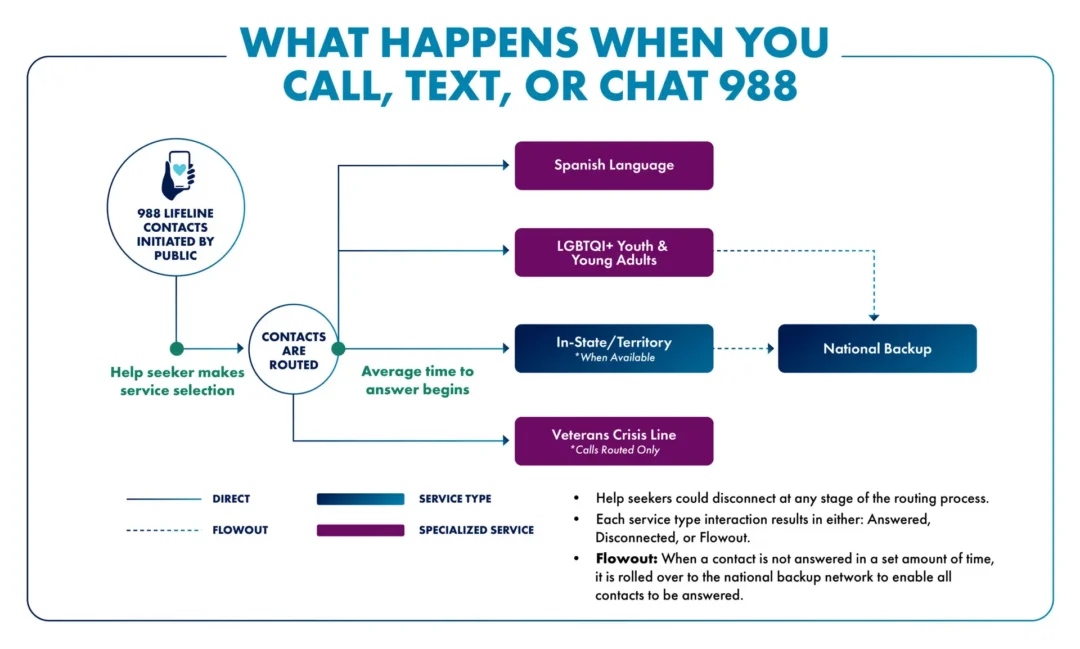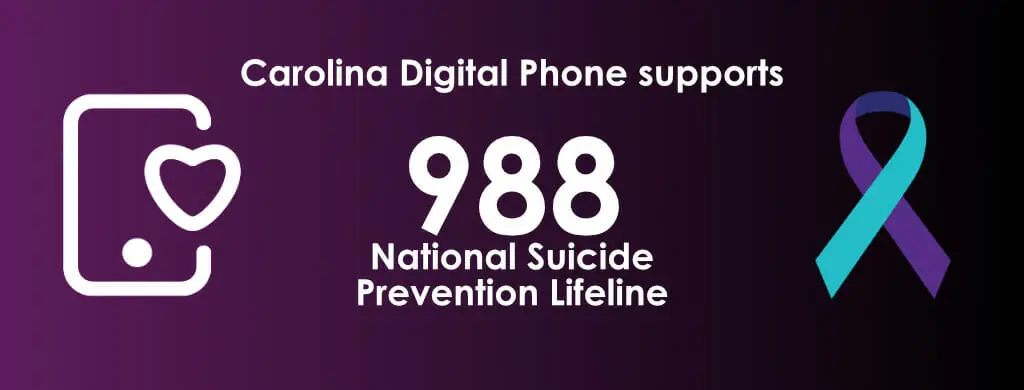What is the 988 Suicide and Crisis Lifeline?
The 988 Suicide & Crisis Lifeline is a nationwide, three-digit hotline launched on July 16, 2022, to provide free and confidential support for individuals experiencing suicidal thoughts, mental health crises, or substance use issues. It replaced the National Suicide Prevention Lifeline’s 10-digit number to simplify access to crisis services. Operated by over 200 local crisis centers and funded by the Substance Abuse and Mental Health Services Administration (SAMHSA), the Lifeline connects callers, texters, and chat users to trained counselors available 24/7. Specialized services include support for veterans, Spanish-speaking individuals, LGBTQI+ callers, and those using American Sign Language. Studies show that interactions with the Lifeline help reduce feelings of distress and increase hopefulness.
Since its inception in 2022, the 988 Suicide & Crisis Lifeline has made significant strides in addressing mental health crises and suicide prevention in the United States. Below are key ways the service has helped:
Increased Accessibility and Usage
- The transition from a 10-digit number to the simple three-digit “988” has dramatically increased awareness and ease of access. Call volume rose by approximately 40% in its first year, reaching nearly 5 million contacts, with continued growth in subsequent years.
- By May 2024, the Lifeline had handled over 10.8 million contacts, including calls, texts, and chats. Text message usage saw the highest relative increase, growing more than elevenfold since launch.
Importance of Local Response
Local response to mental health crises is crucial, especially as we face rising rates of emotional distress among various populations, including service members and veterans. In emergencies, dialing 988 connects individuals to the national suicide prevention lifeline, which has been designated under the national suicide hotline designation act. This phone service provides immediate access to crisis support and emotional support from trained specialists, helping callers navigate their suicidal crisis.
With a simple 988 call or by texting 988, individuals can reach regional call centers that are part of the lifeline network. These crisis lines are equipped to handle a variety of mental health-related issues, ensuring that no one feels alone in their struggle. The Hotline Designation Act of 2020 has strengthened these resources, making it easier for anyone in an emotional crisis to find help, whether for themselves or a loved one.

Call Routing
Call routing is crucial for the 988 Suicide and Crisis Lifeline, as it ensures that individuals in distress are connected quickly and efficiently to the most suitable crisis center. Effective routing, particularly location-based routing (geo-routing), helps link callers to local crisis centers familiar with resources specific to their community. This improvement increases the likelihood of providing relevant support and follow-up care. Call routing ultimately enhances Lifeline’s ability to offer timely and life-saving assistance to those experiencing a mental health crisis by minimizing delays and reducing the burden on emergency services.
Why is local response critical?
Local response is crucial when the national 988 hotline receives a suicide or crisis call because it connects individuals with immediate, community-specific support. Local crisis centers are better equipped to understand the nuances of regional resources, mental health providers, and follow-up care options available in the caller’s vicinity. This familiarity allows for more relevant interventions, facilitates in-person support when necessary through mobile crisis teams, and ensures a smoother transition to local services for ongoing care. Ultimately, a strong regional response network enhances the effectiveness of the national 988 system by providing tailored and timely assistance that addresses the unique needs of individuals within their own communities.
Impact on Crisis Intervention
- The hotline has saved lives by providing immediate support during crises. For example, individuals like Addison Eggebeen have reported that calling 988 during moments of suicidal ideation helped them calm down and regain control of their situation.
- Research suggests that increased call volume to crisis hotlines is associated with reductions in suicide deaths, indicating that the expanded reach of 988 could contribute to lowering suicide rates.
Improved Service Metrics
- National answer rates have improved alongside reduced wait times, ensuring quicker access to crisis counselors. Some states report answer rates as high as 97%.
- The Lifeline has expanded services to cater to diverse populations, including Spanish-language chats, outreach to LGBTQIA+ youth, and an American Sign Language videophone option.
Challenges and Areas for Improvement
Despite its successes, the 988 Lifeline faces challenges:
- Many community crisis services (e.g., mobile response units and walk-in psychiatric services) have not expanded sufficiently to meet increased demand. This limits the ability of callers to access follow-up care after initial contact.
- Feedback from users reflects mixed experiences; while many praise counselors’ effectiveness, issues like long wait times and inconsistent counselor quality remain areas for improvement.
- Funding remains decentralized and heavily reliant on state and local governments, posing challenges to effectively sustaining operations and scaling services.
- Addressing Mental Health Issues at Work
Mental health disorders and stress significantly impact the workplace, affecting job performance, engagement, and overall productivity. Employers can address these issues by creating a wellness culture that includes mental health self-assessments, access to care, and stress management support.
Examples of successful strategies include offering counseling, workshops, quiet zones, and training for managers to recognize signs of stress or depression. Various groups can promote mental health initiatives, including healthcare providers, researchers, community leaders, and government agencies. At the same time, employees can participate in wellness programs, share experiences, practice self-care, and seek support when needed.
Summary
Carolina Digital Phone has proactively supported mental health initiatives by endorsing the “988” Suicide Prevention Hotline. This service provides critical support to individuals in crisis, ensuring they have immediate access to trained professionals. Key takeaways include the importance of promoting awareness about the hotline, which serves as a vital resource for those struggling with suicidal thoughts or mental health issues.
Organizations are encouraged to integrate information about the hotline into their outreach and community support efforts. Additionally, fostering a culture of open dialogue about mental health can significantly reduce stigma and encourage individuals to seek help. Carolina Digital Phone’s commitment reflects a growing recognition of the role that accessible communication services play in addressing mental health challenges. Businesses can contribute meaningfully to their community’s well-being by prioritizing these initiatives.


